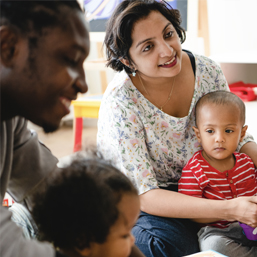
Feeling like you are the only person in the world who is awake as you pace the floor all night with a sick baby in your arms?
Hiding in the dark pantry to cry alone after yelling at your kids because they’ve been bickering at each other for hours on end?
Wondering if you are the only one who has to repeat themselves 3,457 times to get your teenager to complete one simple task?
In all of this uncertainty, one thing is for sure – parenting can be isolating.
This is even more true after the social isolation that came with the COVID-19 pandemic. It is more important than ever to connect with other parents and share your experiences and knowledge.
Dr. Soraya Lakhani, registered psychologist and director of Yellow Kite Child Psychology, says as parents raise their children, they have to redistribute time and energy from other parts of their lives.
“This redistribution can result in parents having to suspend some of their own needs, including spending time with existing friends, making new friends, and engaging in activities that might bring them a sense of happiness, relaxation and connectedness,” she says.
“When people are overwhelmed and need support but feel a sense of shame in asking for help, that can lead to a sense of isolation. All parents struggle, yet many parents go through that experience feeling utterly alone, which is really quite heartbreaking.”
It takes a village
As cliché as it sounds, there is a reason the term ‘it takes a village to raise a child’ is so common – it’s true.
Chelsea Flemons found this out the hard way when she moved from Calgary to Fort McMurray for her husband’s job.
The mother of two girls, ages eight and four, says she didn’t know anyone in her new city, and she felt terrified, lonely and sad at the prospect of moving somewhere with no support system.
“But I had my girls and we were able to get out there and meet people together,” she adds.
“It’s really amazing how quickly it happens if you just put yourself out there a bit. I am the type of person that needs to get out and do things, so I knew if I didn’t make the effort, those negative feelings wouldn’t change.”
It's healthy for parents to be reminded that nobody has all the answers and it is okay to feel lost and need support.
“Having connections with other people in similar contexts can provide a sense of community,” says Dr. Lakhani.
“At the very least, it helps parents recognize that they aren't alone. And, of course, it can be a valuable forum for parents to exchange ideas, obtain resources, and discuss avenues they can pursue if they need support.”
Finding your parenting ‘tribe’ can be difficult and even awkward. It’s often compared to dating in that when you meet a new parent, you need to get to know them to learn if they are ‘your people’ – if you share the same interests, values, parenting styles etc.
“As with all relationships, when breaking the ice, be open to making the first move when initiating conversation with another parent,” advises Dr. Lakhani.
“Compliments are great, as are questions. For example: ‘I love your kid's XYZ’ and ‘Where did you get your child's XYZ?’ The parenting experience can be hugely varied, but there are a lot of universals as well, and talking to another person who understands the joys and challenges of parenting already offers tremendous common ground.”
Togetherness through technology
Chelsea chose to make connections through social media.
“My very first step to making these connections was joining 'The Mommy Network' on Facebook in Fort McMurray,” she says.
“I simply posted that I am new here. I have two girls and would love to meet some new friends. The response was overwhelming. With some of the women I met up with, we connected instantly and have become very close since. I would consider them some of my best friends.”
Technology has kept up with this trend of moms turning to their phones and computers to connect. Social.mom and Peanut are two apps that are designed to be like dating apps for moms to help lonely parents connect with matches who live nearby.
Peanut is advertised as “the social network for women to connect across fertility and motherhood. Build friendships, find support and learn from one another,” while Social.mom “allows you to make friends with moms that live near you.”
Dr. Lakhani says the advances in technology meant to bring people together are great. “Parents should set themselves up for success and make formulating connections as easy as possible, in whatever way feels most natural and rewarding for them,” she says.
In-person parenting
If creating connections through social media and apps isn’t your thing, there is no shortage of organized face-to-face options. These activities include programs offered at local libraries, yoga, swimming lessons, music classes, gymnastics, dance classes and more.
While more organic connections can be made at the playground, while picking your child up from school, at local indoor play places and other outings where you might run into another parent with similar interests who lives near you.
No matter how you find them, building parenting connections couldn’t be more important for you, your spouse and your children.
“Feeling alone, overwhelmed, and isolated can take a significant toll on a parent's physical, emotional, and mental health,” says Dr. Lakhani.
“It can result in parents feeling burnt out and like they don't have the bandwidth to live life the way they want to. When parents are burnt out, it can impact their capacity to connect with their children and spouses. A lack of social connectedness can really reinforce the sense of being completely and utterly alone in navigating the parenting journey, and that can leave parents feeling taxed and exhausted, and with nowhere to go to unload or recharge.”
See our related articles:
Calgary’s Child Magazine © 2024 Calgary’s Child